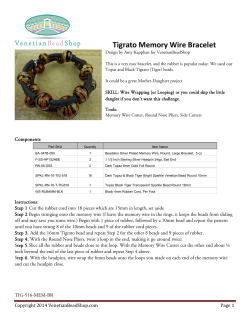
Consortium Contact Project Coordinator Dr. Ingrid M. van der Meer
Consortium Wageningen UR (The Netherlands) www.wageningenur.nl/en/ExpertiseServices/Research-Institutes/ food-biobased-research www.wageningenur.nl/en/ExpertiseServices/Research-Institutes/foodbiobased-research.htm KeyGene (The Netherlands) www.keygene.com Institute of Botany (Czech Republic) www.ibot.cas.cz Contact Project Coordinator Dr. Ingrid M. van der Meer Ingrid.vanderMeer@wur.nl Phone +31 31 74 81 363 The project will offer the European Union a unique competitive advantage because it involves the experts in the field of biotechnology, breeding, agronomy, extraction & biorefinery, and product manufacturing of Russian dandelion rubber and inulin. Most importantly, DRIVE4EU will bridge the gap between research and the market. Tereos Syral (France) www.tereos-syral.com GEA Westfalia Separator Group GmbH (Germany) www.westfalia-separator.com Apollo Tyres Global R&D B.V (The Netherlands) www.apollotyres.com DRIVE4EU – 'Dandelion Rubber and Inulin Valorization and Exploitation for Europe', a demonstration project, that supports the development of the production chain of natural rubber and inulin from Russian dandelion. The objective of the project is to set up a European chain for the production and processing of natural rubber and inulin. This will enable the EU to become less dependent on the import of natural rubber and at the same time to respond to the threat of a global rubber shortage. QEW Engineered Rubber BV (The Netherlands) www.qewrubber.com InExCB.KZ (Kazakhstan) www.inexcb.kz Mitas (Czech Republic) www.mitas-tyres.com Rusthoeve (The Netherlands) www.proefboerderij-rusthoeve.nl JOANNEUM RESEARCH (Austria) www.joanneum.at ILVO – Institute for Agricultural and Fisheries Reserach (Belgium) www.ilvo.vlaanderen.be NETZSCH – Feinmahltechnik GmbH (Germany) www.netzsch.com www.drive4EU.com DRIVE4EU is funded by the 7th Framework Programme of the EC Improved agronomical methods for an optimized cultivation for TKS are developed. Next to the optimized cultivation, best methods to harvest and store the TKS roots are established. The quality and as well applicability of natural rubber and inulin is demonstrated. This will be reached by developing prototype products from these biomass components. The main objectives of DRIVE4EU are: breeding of plant genotypes with high root biomass, high rubber and inulin yield, amplification of seed batches for agronomic tests and large scale demo field trials, The DRIVE4EU consortium consists of eight industrial partners and five research organizations from six EU countries and Kazakhstan. They bring together a wide knowledge and expertise, from bioscience to product development. 0.01 demonstration of the economic viability of the TKS production chain for natural rubber and inulin. R&D C DR urr IV en E4 t: EU testing and application of TKS natural rubber and inulin in end product uses, and EU Pa -P st EA : RL S scaled-up and optimized extraction and refinery protocol for TKS natural rubber and inulin, Production scale (ton or ha) ecological analysis of the gene flow between TKS and other, wild, dandelion species, Demonstrate economic potential IN Fut DU ur ST e: RY Business driven production chain optimized cultivation and harvest methods for TKS, During this time period, the highest yields achieved in the U.S. were 110 kg of rubber per hectare, while in the USSR yields of 200 kg of rubber per hectare were attained. With the return of affordable Hevea brasiliensis rubber and the expected future of non-natural rubber from the petrochemical industry at the end of World War II, the majority of TKS programs were discontinued. ■ ■ Seed production capacity ■ ■ Crop acreage ■ ■ Processing scale ■ ■ Market size : ure Y Fut STR U IND ■ ■ Root yield C DR urr IV en E4 t: EU A biorefinery process is designed. The biorefinery process includes and optimally uses all valuable products from TKS roots. TKS was cultivated on a large scale in the Soviet Union between 1931 and 1950, as well as in the United States, the UK, Germany, Sweden and Spain during World War II. It was used as an emergency source of rubber when supplies of rubber from Hevea brasiliensis in South East Asia were threatened. 500 ha Information about the gene flow and interaction especially competition between the cultivated TKS and the wild dandelions is gained. 50 DRIVE4EU will demonstrate the technical and economic feasibility of the use of Russian dandelion as a production platform for both natural rubber and inulin. The inulin can be used as raw material for interesting green chemicals, such as furan-based polymers. The combination of rubber and inulin makes Russian dandelion very interesting as a production platform. Taraxacum koksaghyz (TKS) is a wild, non domesticated plant species, with a relatively low root mass (the main source of natural rubber) and rubber yield. A TKS plant with higher productivity is created and the new genotypes are propagated via seeds. 5 At the moment natural rubber is almost exclusively harvested from the rubber tree (Hevea brasiliensis) of which about 90% is grown in South East Asia. In an earlier EU research project, EU-PEARLS, also coordinated by Wageningen UR, the potential of two alternative natural rubber sources was investigated. This project yielded a simple, efficient extraction method for Russian dandelion (Taraxacum koksaghyz, TKS) rubber as well as knowledge enabling significant and rapid advances in dandelion breeding. Expected Results 1 Objectives 1 ■ ■ Rubber & Inulin yield ■ ■ Processing cost & purity ■ ■ Total biomass valorisation 3 4 5.0 k€/ha Crop Quality (€/ha) prm pbf 14210
© Copyright 2025


















